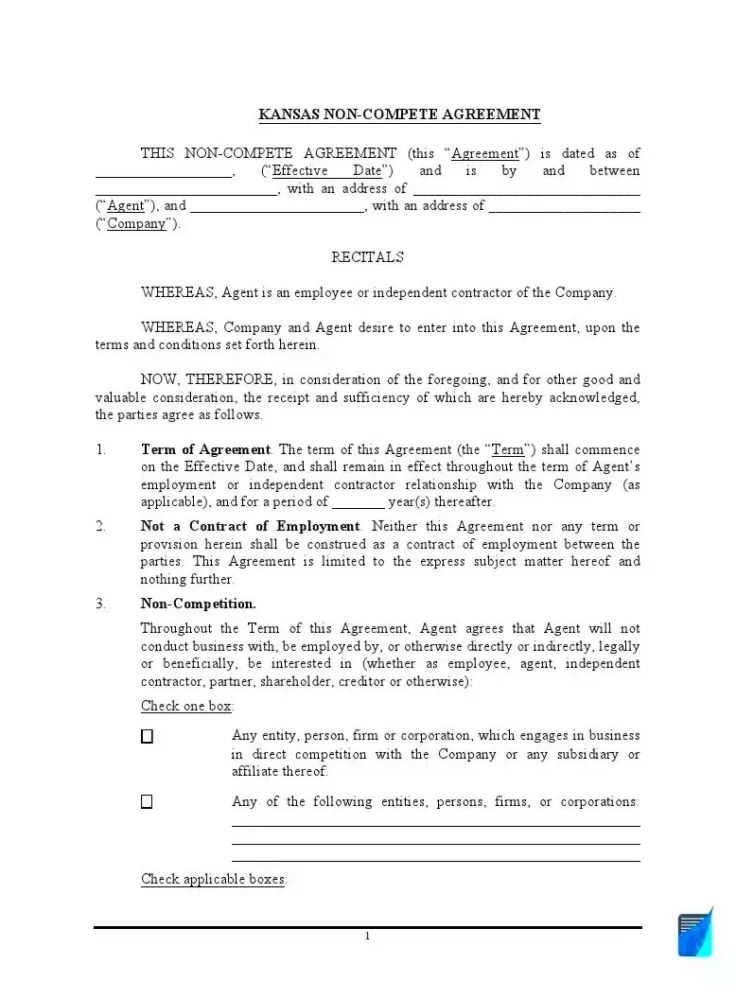Non-Compete Laws in Kansas
Non compete clauses are legal arrangements aimed at safeguarding companies against competition by limiting ex employees from joining rival firms for a set duration. In Kansas these clauses must adhere to guidelines that both employers and workers should be aware of. Having observed the effects of these agreements up close it’s evident that they have an influence on the business environment although debates often arise regarding their fairness and implementation.
A non compete agreement usually specifies the duration, location and nature of work that an employee is prohibited from engaging in after departing from the company. The purpose is to stop the employee from leveraging information to gain an edge over a rival. However striking a balance, between safeguarding business interests and providing opportunities for employees is a challenge. Many believe that these agreements, if too stringent can hinder a persons career advancement and personal freedom.
What Makes a Non-Compete Agreement Valid in Kansas
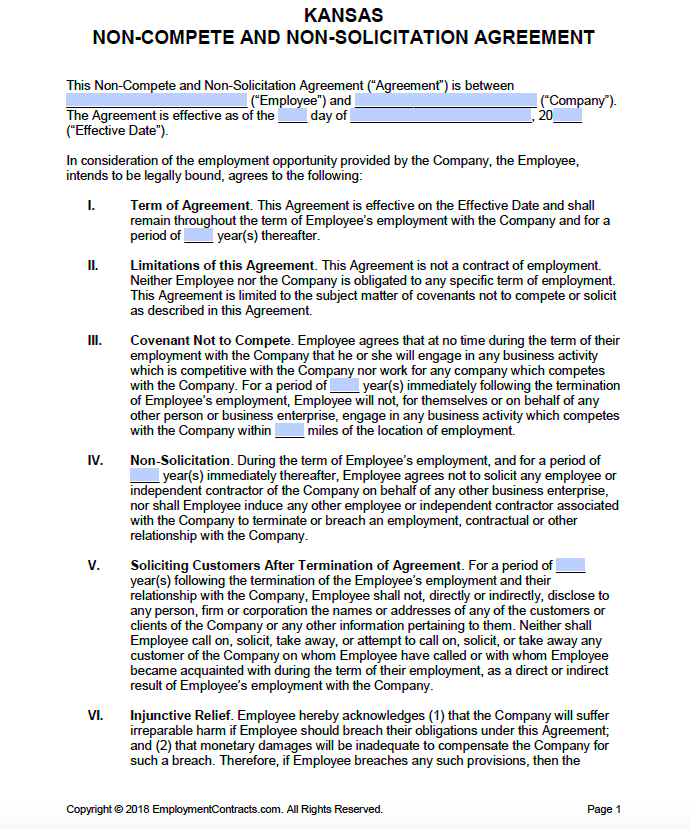
In order for a non compete agreement to hold up in Kansas it needs to fulfill certain essential criteria. From what Ive seen these stipulations play a role in making the agreement just and binding.
- Reasonableness in Scope: The agreement must be reasonable in its geographic scope and duration. For instance, a five-year restriction on working in an entire state might be deemed excessive, while a six-month restriction within a specific city might be acceptable.
- Legitimate Business Interest: Employers need to demonstrate that the non-compete agreement protects a legitimate business interest, such as trade secrets or confidential information.
- Consideration: There must be something of value exchanged for the non-compete agreement to be valid. This could be in the form of employment, promotion, or other benefits.
- Clarity: The terms of the agreement must be clear and specific to avoid ambiguity, which can make enforcement challenging.
Based on what I’ve seen grasping these aspects is vital for both companies and workers. Companies must make sure their contracts are carefully written to prevent expensive lawsuits, while employees need to be informed about their rights and responsibilities outlined in these contracts.
Restrictions on Non-Compete Agreements in Kansas
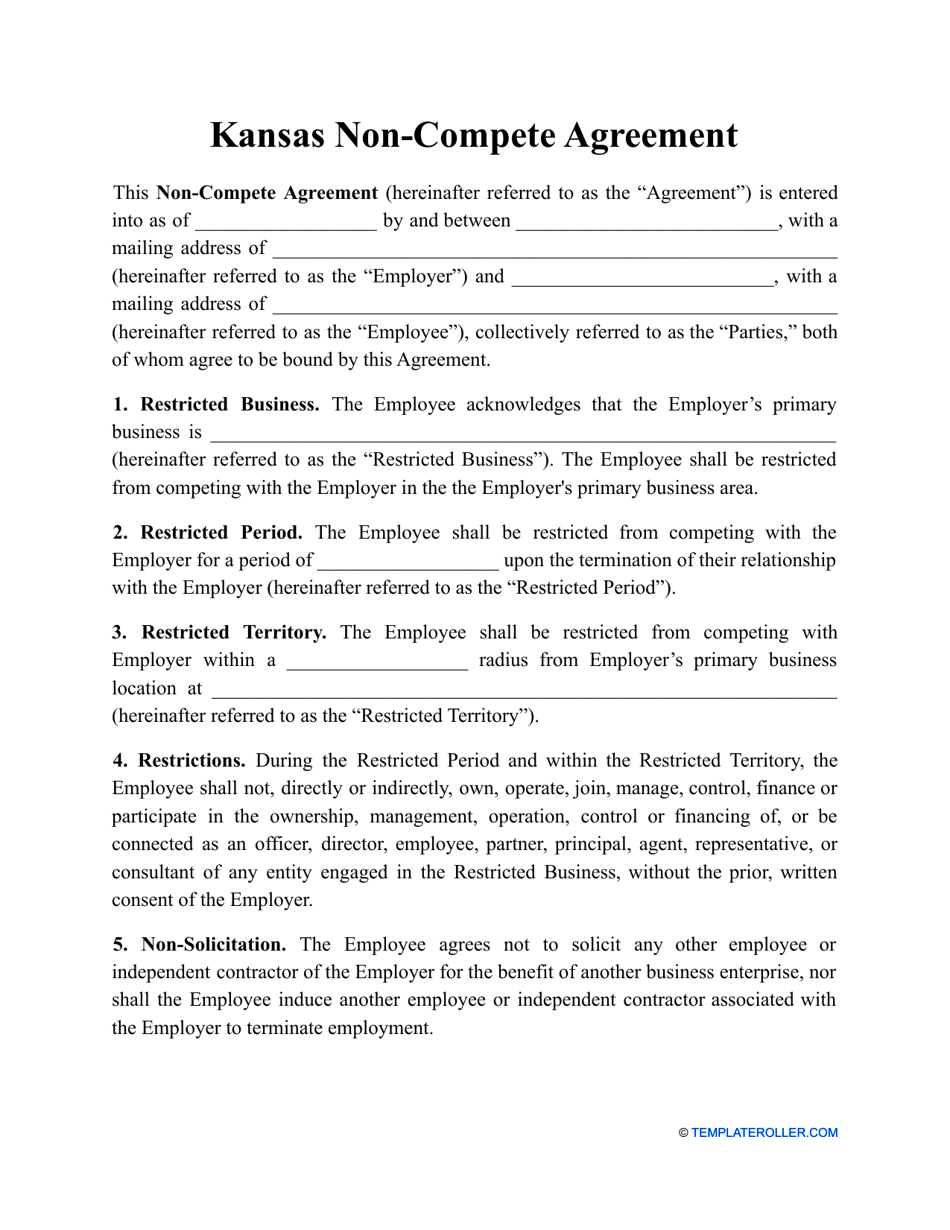
In Kansas there are rules and limitations on non compete agreements to safeguard employees from excessively burdensome terms. These rules demonstrate an increasing emphasis on equity and harmony in workplace policies. Here are a few highlights.
- Duration: Kansas courts generally view non-compete agreements with a duration longer than two years as suspect. A typical agreement should be limited to a period that is reasonable and necessary to protect the employer’s interests.
- Geographic Limitations: The geographic scope of a non-compete agreement should be reasonable and directly related to the area where the employee had significant involvement or where the employer operates.
- Scope of Activities: The scope of activities restricted by the agreement must be directly related to the employee’s work and the employer’s legitimate business interests. Overly broad restrictions can be deemed unenforceable.
Witnessing the challenges and misunderstandings caused by non-compete agreements it becomes crucial for both employers and employees to grasp these limitations. Employees should strive to gain insight into how these agreements affect their future job opportunities. On the hand employers need to make sure that their agreements are just and legally binding according to Kansas regulations.
Enforcing Non-Compete Agreements in Kansas
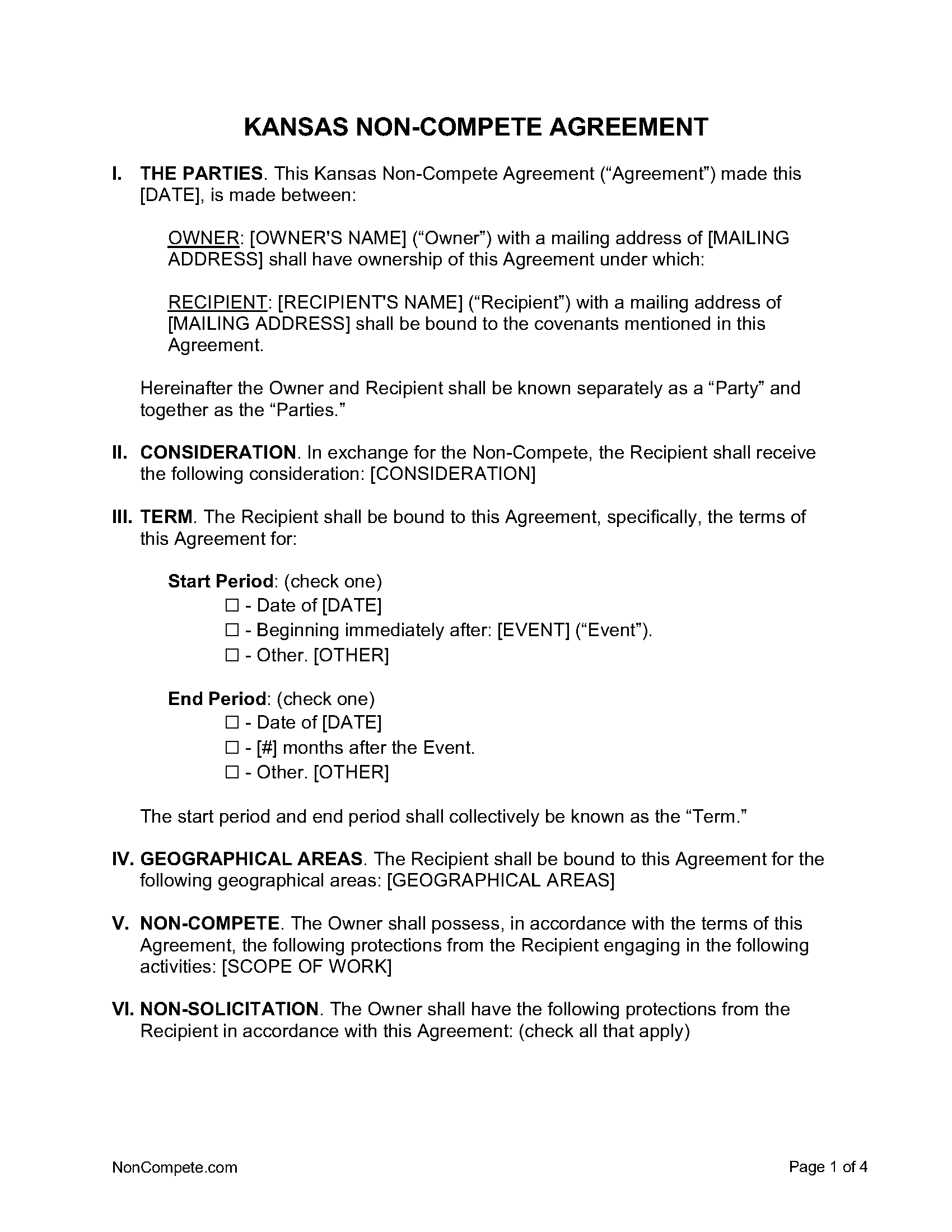
In Kansas enforcing noncompete agreements can prove to be a task. Based on my experiences I have witnessed conflicts emerge when these contracts lack clarity or appear overly rigid. Its essential to grasp the subtleties of enforcement to steer clear of potential legal challenges.
In order for a company to effectively uphold a non compete clause in Kansas it needs to be both fair and specifically focused. Kansas courts will consider these aspects when making their judgment.
- Reasonableness: The restrictions must be reasonable in terms of duration, geographic area, and scope. If an agreement is too broad or lengthy, it might be deemed unenforceable.
- Legitimate Business Interest: Employers must show that the non-compete is protecting a legitimate business interest, such as trade secrets, confidential information, or customer relationships.
- Clarity: The terms of the agreement should be clear and specific. Ambiguous terms can lead to disputes and make the agreement harder to enforce.
Enforcement usually means taking matters to court where the employer has to prove their case. Judges will look closely at whether the agreement is fair and if it places an unfair burden on the employee. In my observations its wise for both sides to brace themselves for a drawn out and expensive legal fight in case any disagreements come up.
Legal Considerations for Employers
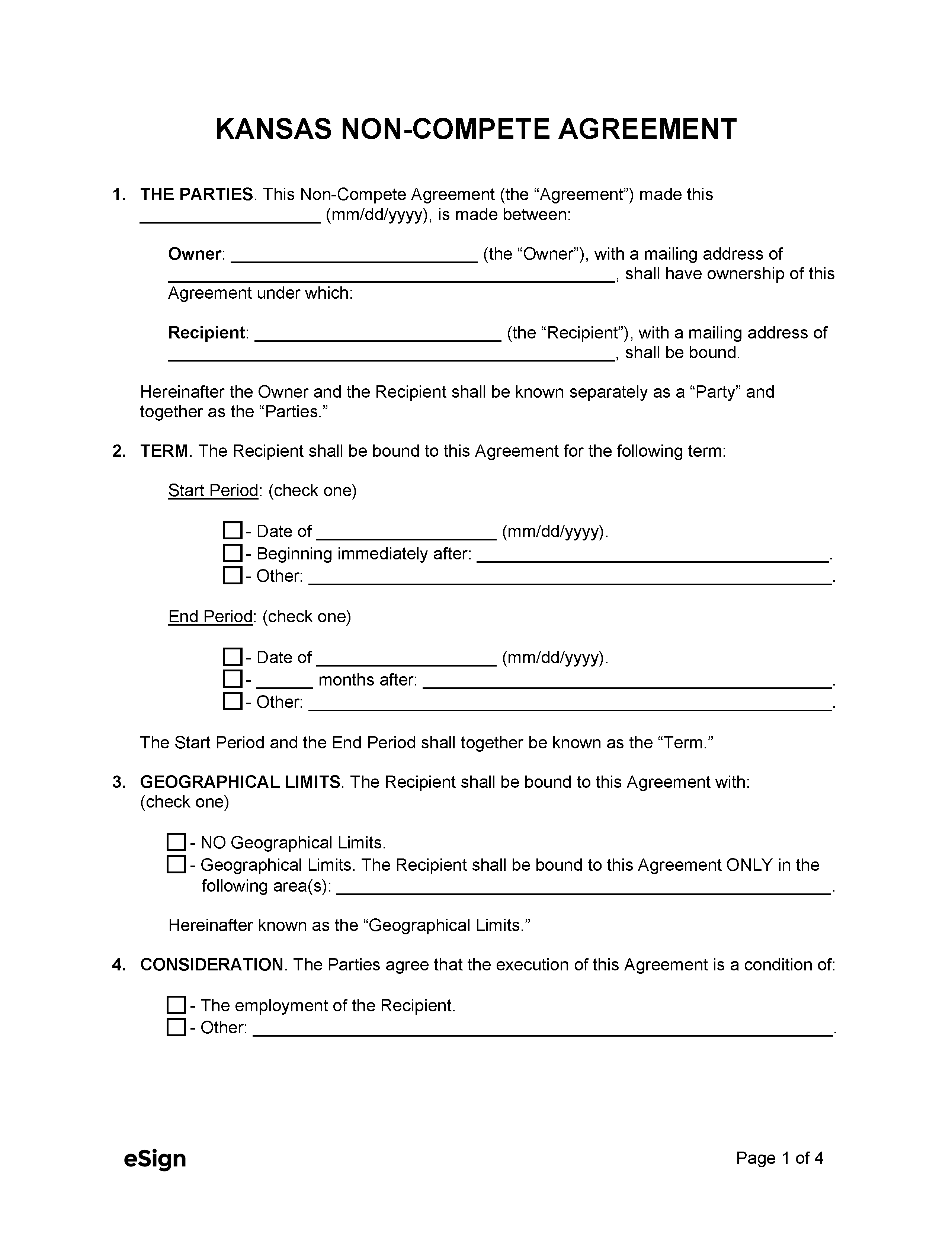
When employers create and uphold non compete agreements they must carefully navigate various legal aspects. These factors help ensure that the agreements are both valid and just. In my opinion here are some important points for employers to keep in mind.
- Drafting with Precision: It’s vital to draft non-compete agreements with precision. Employers should define the scope, duration, and geographic limitations clearly. An agreement that is too broad can be challenged in court.
- Legal Counsel: Consulting with a legal expert is advisable to ensure that the non-compete agreement complies with Kansas law. This can help avoid pitfalls and ensure the agreement’s enforceability.
- Consideration: Ensure that the agreement provides adequate consideration. This means offering something of value, such as a job, promotion, or special training, in exchange for the employee’s agreement to the restrictions.
Based on what I’ve seen careful preparation and seeking legal advice can help employers avoid conflicts and safeguard their interests without unjustly limiting their employees career prospects.
Legal Considerations for Employees
To navigate their careers effectively employees need to be aware of their rights and responsibilities when it comes to non compete agreements. Here are some key legal aspects for employees to keep in mind.
- Understanding the Terms: Employees should carefully review the terms of any non-compete agreement they sign. Understanding the scope, duration, and geographic limitations is crucial for knowing how the agreement might impact future job opportunities.
- Seeking Legal Advice: If unsure about the terms or fairness of a non-compete agreement, seeking advice from a legal professional can be beneficial. Legal counsel can provide clarity on whether the agreement is enforceable and what options are available.
- Negotiation: Employees may have the opportunity to negotiate the terms of the non-compete agreement. It’s often worthwhile to discuss any concerns with the employer before signing the agreement.
Through my experiences with employees dealing with these agreements, I have witnessed how crucial it is to know your rights and obtain legal guidance. This can greatly impact the situation by preventing unfair restrictions on employees and allowing them to advance in their careers without unnecessary legal hurdles.
Common Disputes Related to Non-Compete Agreements
Non compete agreements can sometimes cause tensions between bosses and workers. In my observation these conflicts typically stem from misinterpretations or differences of opinion regarding the specifics of the contract. Let me highlight some issues that often come up.
- Overly Broad Terms: Disputes frequently occur when the non-compete terms are seen as too broad or restrictive. For example, an agreement that prohibits working in any industry within a large geographic area may be contested for being unreasonable.
- Ambiguity: If the language in the agreement is unclear or ambiguous, it can lead to disputes. Both parties might interpret the terms differently, leading to conflicts about what is and isn’t allowed.
- Enforceability: Legal battles often center around whether the agreement is enforceable. Courts may find agreements invalid if they do not meet the legal requirements of reasonableness and necessity.
- Violation Allegations: Employees sometimes face allegations of violating the non-compete terms, even if they believe they are in compliance. This can lead to legal disputes that can be time-consuming and costly.
Based on my own encounters I have found that these conflicts can take a toll on both your well being and finances. It can be advantageous for both employers and employees to consult with legal experts to address these matters peacefully and steer clear of protracted courtroom disputes.
Recent Changes and Developments in Kansas Non-Compete Law
The evolution of non compete laws in Kansas has been shaped by shifts in the business landscape and societal norms. Its important for both employers and employees to stay updated on these changes. Here’s a brief overview of the recent developments.
- Legislative Changes: Recent legislative efforts have focused on making non-compete agreements fairer and more balanced. For instance, there have been discussions about limiting the duration and geographic scope of such agreements to protect employees’ career opportunities.
- Judicial Interpretations: Kansas courts have been interpreting non-compete agreements with increasing scrutiny. There’s a trend towards ensuring that these agreements are reasonable and do not unduly restrict an individual’s ability to work.
- Employee Protections: New developments often include enhanced protections for employees, ensuring that non-compete agreements are not used as a tool to unfairly limit job opportunities or exploit workers.
By closely monitoring these shifts, I’ve observed their effects on the dynamics between employers and employees as well as the broader business environment. Staying updated on these changes aids in making choices and creating contracts that are just and legally binding.
FAQ About Non-Compete Laws in Kansas
Grasping the intricacies of non-compete laws can be challenging. To shed light on some common issues here’s a list of questions that are often asked.
- What is a non-compete agreement? A non-compete agreement is a contract that restricts an employee from working for competitors or starting a similar business for a specified period and within a certain area after leaving their current employer.
- Are non-compete agreements enforceable in Kansas? Yes, but they must be reasonable in scope, duration, and geographic area. Courts in Kansas will assess whether the agreement protects legitimate business interests without unduly restricting the employee.
- Can I negotiate the terms of a non-compete agreement? Yes, negotiating terms is often possible. If you feel that the terms are too restrictive, discussing your concerns with the employer before signing can lead to more favorable terms.
- What should I do if I believe my non-compete agreement is unfair? If you believe your agreement is unfair or unenforceable, seeking legal advice is a wise step. A lawyer can help you understand your rights and options for challenging the agreement.
In my view grasping these factors can ease worries and enable both companies and workers to handle non compete contracts more efficiently.
Conclusion on Non-Compete Laws in Kansas
Non compete agreements are crucial for safeguarding business interests in Kansas although they do have their challenges. Based on my observations it’s clear that these agreements must find a balance between protecting a companys confidential information and giving employees the liberty to advance in their careers.
When it comes to creating non compete agreements employers need to be careful and fair. Making sure the agreements are reasonable in terms of their extent, length and location helps prevent legal issues and keeps a good relationship between employers and employees. Seeking advice from professionals can greatly assist in crafting agreements that are enforceable and align with Kansas regulations.
Workers, in contrast ought to take the initiative to grasp the details of non compete agreements they enter into. If there are worries regarding the fairness of the agreement seeking legal counsel can offer insights and possibly result in more advantageous conditions. Being knowledgeable and ready can assist in dealing with challenges that may come up due to these agreements.
To sum up although non compete laws in Kansas aim to safeguard business interests it’s crucial for both employers and employees to carefully consider these agreements and fully comprehend their rights and responsibilities. A thoughtfully crafted agreement not only benefits both parties involved but also promotes a work atmosphere.
